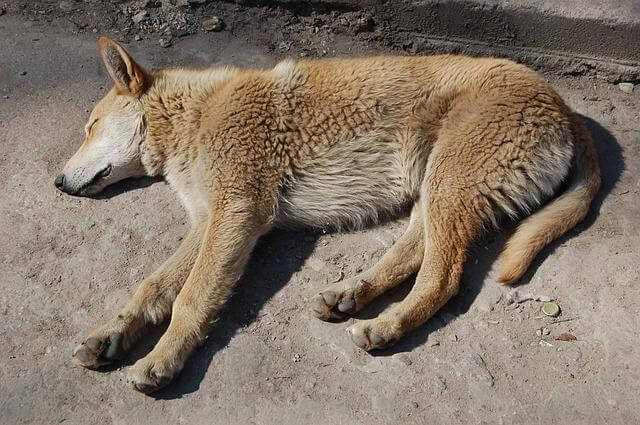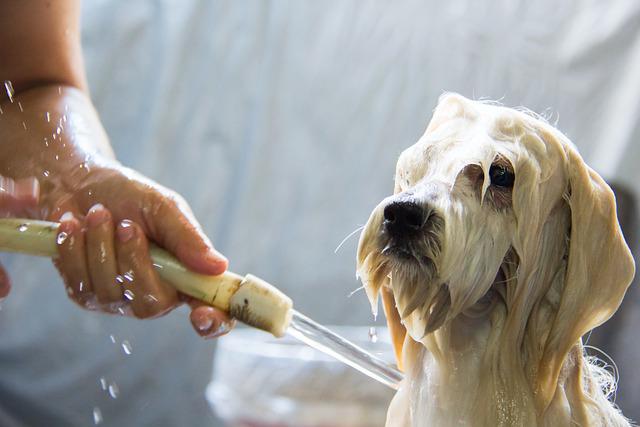Is your precious pooch a little on the nose? We look at why some of our dogs smell and the times when your dog’s odour could be a sign of possible skin problems.
For dog owners around the globe, a smelly dog problem is something they have either overcome or are currently experiencing with their beloved dog. From rolling in something ultra-smelly down the dog park, taking a dip in the ocean, or even the breed of your pet can cause a dog to have a certain odour. But when should you be concerned?
It’s important to note that if your dog suddenly starts to smell a good groom could be in order to check the health and condition of your pet’s coat. Allergies can be a leading cause of a pungent coat and dog.

There are lots of potential causes, but more often smelly coats relate to the overgrowth of bacteria and/or yeast on the skin surface, which is more common in dogs with allergies. Interestingly dogs with allergies can have no infections, which can also lead to smelly coats. Instead, they could be suffering from very active sweat glands. With allergies, these glands can be overactive, and the oils produced are often smelly.
Flea allergy can also lead to skin irritation and secondary infections.
Signs of an Unhealthy Coat
- Loss of hair and patchy areas
- Dull dry coat
- Smelly odour
- Lumps, dryness, or bumps on the skin
- Sore red spots on the skin or open hot spots
- Flaky skin
- Itchy inflamed skin
If you suspect your dog’s odour could be caused by underlying allergies it’s a good idea to book a consultation with your vet to rule out problems. Also, consider if anything has changed in your dog’s environment. Seasonal change? Diet Change? Or perhaps a change in shampoo? Asking these questions will allow you to pinpoint what could possibly be causing the allergy and leading to a stinky dog.
Secondary yeast and bacterial infections caused by allergies can lead to a distinctly sickly-sweet smell, that is not very pleasant for humans (you’ll want to keep the dog off the couch), and terribly uncomfortable for your pet. If you are concerned, a veterinary consult is recommended.
Ensuring your dog is eating a well-balanced and correctly manufactured diet can also help with skin conditions and smell. Custom meal plans from Raised Right Dog Food can help you adjust your dog’s food until you find the right fit.
What About Breeds?
Certain dog breeds smell more than others. This can be due to thicker coats, long hair, and folds on their faces. As with all breeds, doing your research can help you best prepare for the type of dog you choose to bring into your home. Dogs with lots of folds on their faces need particular care in cleaning to prevent yeast infections in these folds that can increase their smell. As too, double-coated breeds and those with long hair. Ensuring you get into a good grooming pattern can help decrease the smell with certain breeds of dogs.
Washing Your Dog
When you are trying to abolish the smell, it’s a good idea to invest in a quality dog shampoo. Human grade shampoo may smell wonderful to our noses, however, the pH of human skin compared to that of your dogs is vastly different. Your pooch may smell nice on the onset, but if you are trying to combat allergies or any skin-related issues, you may find you only escalate the problem and make it worse.

The pH of human skin is much lower and more acidic than that of a dog. Using shampoos designed for humans can upset the skin pH and potentially change the normal bacteria and yeast living in small numbers on the skin surface. This can lead to problems and more of the smell you are trying to eliminate.
Investing in a good-quality shampoo specifically for your dog is the best way to go. It’s also a good point that all dogs smell like a ‘wet dog’ when they have been initially washed. This is due to the important oils that your dog’s coat contains.
Also, remember that some breeds – particularly traditional water dogs – will have a good amount of hair and oils to keep their coats in good condition. It takes a whole lot of scrubbing to remove this oil or the bacteria/yeast build-up that causes the smell. Bacteria/yeast build-up will normally require a specially formulated medical shampoo to remove.
Normally the ‘wet dog’ smell will go once your pooch is nice and dry.
Can Omega Oils Help?
Most certainly! Clinical studies have shown that Omega Fatty Acids, like evening primrose, can be a huge benefit for skin health in our pets. It’s advised to always check with your local veterinarian about supplementing your dog’s diet for coat issues or smell issues. When using any Omega Oils, it’s good to note that it will take around six weeks to notice any improvement.
With a little understanding and consideration, you can drastically improve the smell of your dog and the health of your dog’s coat and skin.
- What Are the Perfect Dog Breeds for Young Families? - July 17, 2024
- Important Things to Know Before Getting Your First Pet - June 4, 2024
- 6 Reasons to Choose a French Bulldog as Your Pet - March 21, 2024


GIPHY App Key not set. Please check settings